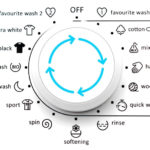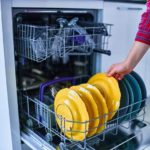If you think that your dishwasher is taking a long time to finish a cycle, you need to do multiple tests to see if you’re right.
To do this, run a standard cycle a few times and record how long the cycles take. Go to your user manual and compare your times against what’s in the handbook.
You might find that there is very little to no difference between the times. On the other hand, there might be a major difference.
(Can’t find your manual? Go to the manufacturer’s website and download a copy from there).
There are a number of reasons why your dishwasher may seem like it’s taking a while to finish. I’ll discuss these reasons below.
Reason 1: First time using a new dishwasher
If your new companion has just done its first cycle and you thought it took a while, there’s no need to worry.
New dishwashers, that have never been used before, sometimes take a few cycles to calibrate themselves, and to ‘bed in’.
It’s perfectly natural for a cycle to take longer than it should, and you shouldn’t try and stop this cycle because the machine is learning at this point.
If overly long cycles persist then you should consider the reasons below.
Reason 2: Modern dishwasher
Perhaps your dishwasher is taking longer than you expect to finish because it’s modern. I know this sounds silly but stick with me while I explain this.
If you’re new to the modern dishwasher scene, you might be surprised to know that a few things have changed since you bought your former kitchen appliance.
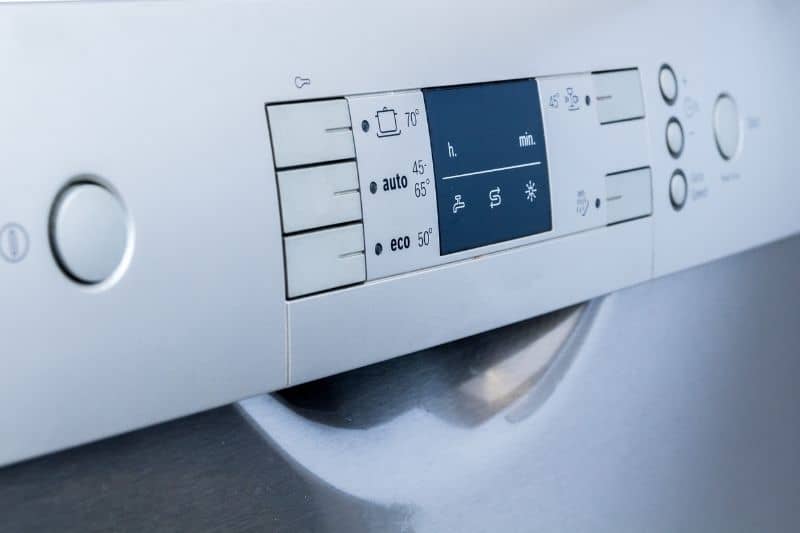
What do I mean by this?
In a nutshell, we live in a pretty technology-driven era, where a lot of people want to save water when using a dishwasher.
Dishwasher manufacturers have listened and adapted their products to suit this new era and way of thinking, and in doing so they’ve created energy-efficient dishwashers.
These modern dishwashers have got all the clever tech built into them and they don’t use a lot of water. But, because of these new features, modern dishwashers take longer to finish a cycle.
It does sound counterintuitive, but modern dishwashers actually work very efficiently, they just take a tad longer that’s all. And this could be why you’re experiencing longer cycles than usual.
Reason 3: Wrong cycle selected
Sometimes when we’re in a rush we click the wrong settings on our appliances. So, if your dishwasher is taking longer to finish, make sure you actually choose the correct cycle to begin with.
It’s a really common error with both old and new models, but it can be avoided in the future by double-checking which cycle has been chosen.
Reason 4: ‘Auto’ or ‘Sensor wash’
If you own a very modern dishwasher, you might’ve noticed a button that says ‘Auto’ or ‘Sensor wash’ at the top. If you press this button great things start to happen!
What do I mean?
Basically, if you press the ‘Auto’ or ‘Sensor wash’ button on your dishwasher, your dishwasher will automatically check how dirty your dishes are, and it will go on to choose an optimal wash cycle for you.
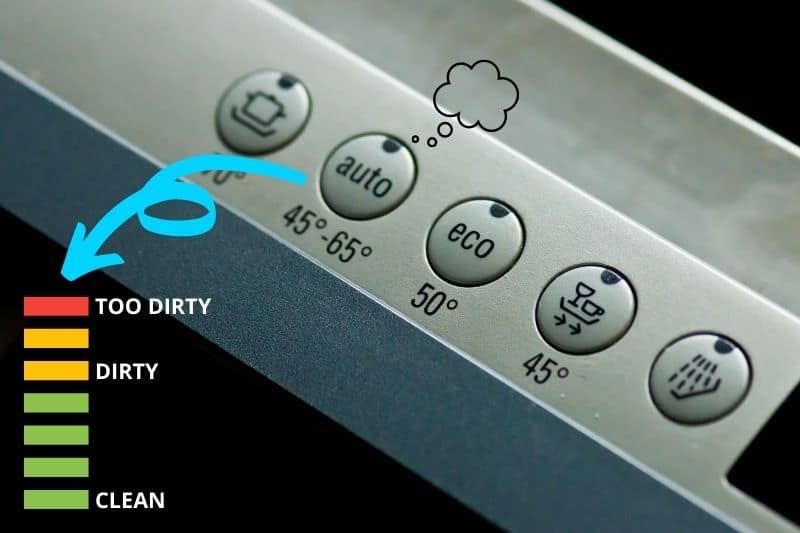
This means that the dishwasher chooses how long a cycle is going to be, how much water it’s going to need, and how hot the water needs to be to give your dishes a thorough clean. It’s a very clever setting that saves a lot of time, money, and stress.
Why am I telling you all of this?
In a nutshell, there are some cases where people press this setting and don’t really understand what it means. So, they end up thinking that their dishwasher is taking a long time to finish.
When in reality the dishwasher is only doing a longer cycle because it’s deemed that the dishes need to be washed for longer. There isn’t actually a problem with the dishwasher, it’s only doing what it’s supposed to do.
Think about it, if you’ve loaded your dishwasher up with a pile of greasy pots and pans, the ‘Auto’ or ‘Sensor wash’ senses the grime and starts an optimal wash to get the pots clean. It will take a while to go through the cycle.
On the flip side, if you use the ‘Auto’ or ‘Sensor wash’ to clean general dirt off plates, you might find that the dishwasher cycle is over a lot quicker than you expected.
I’d like to point out that this ‘Auto’ or ‘Sensor wash’ setting is fairly new, so if you’ve got an older dishwasher you probably don’t have this setting.
Reason 5: Dirt and limescale build-up
Your dishwasher needs to be cleaned, and if you don’t clean it properly dirt and limescale start to build up inside the machine.
On occasions the cleaning sensor gets dirty, and this then triggers a longer cycle because the machine thinks there’s still dirt on the dishes. But, in reality, the sensor is dirty and the dishes are clean.
A quick clean with some dishwasher cleaner would do the job.
Reason 6: Water isn’t warm enough
The water in a dishwasher needs to be hot enough to clean all of the grime off the dishes.
However, if the water isn’t warm enough the dishwasher has to stay on for longer, so the water heats up to clean the dishes properly, hence the longer cycle.
The desired temperature is usually around 130-140 °F (54-60 °C).
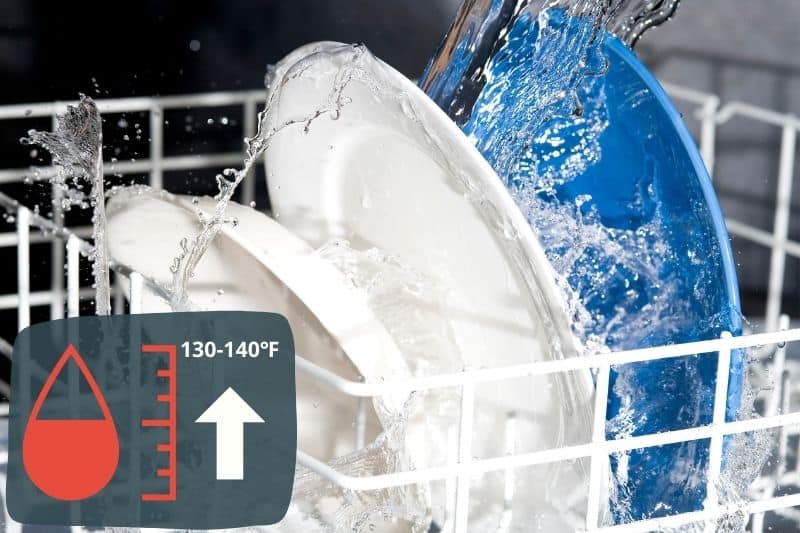
Tips for the future:
- Make sure that the dishwasher is connected to the hot water supply and not the cold.
- Run the tap next to the dishwasher to get the hot water to go into the dishwasher faster.
- Make sure the insulation in the dishwasher is working as it should. If it’s not, it will release heat and this isn’t good for the dishwasher.
- Check the heating element to see if it’s functioning as it should. It can be fixed if need be.
If you need to fix anything mentioned in the points above you might need to call in professional help, or you could try fixing the problem yourself.
Reason 7: Water pressure is insufficient
You need sufficient water pressure to get your dishwasher working. If you don’t have enough water pressure going into the appliance in the first place, it has to wait around to build up momentum. It will then take longer to complete a cycle.
You need a water pressure supply that is between 20-120 psi.
Reason 8: Dishwasher is clogged up
If dishwashers aren’t maintained and cleaned, they will become clogged up. Anything can clog up a dishwasher from chunks of food to grease, to hair.
This stops water from draining in and out of the dishwasher properly. This results in the water taking more time to get in and out of the machine, hence the longer cycle.
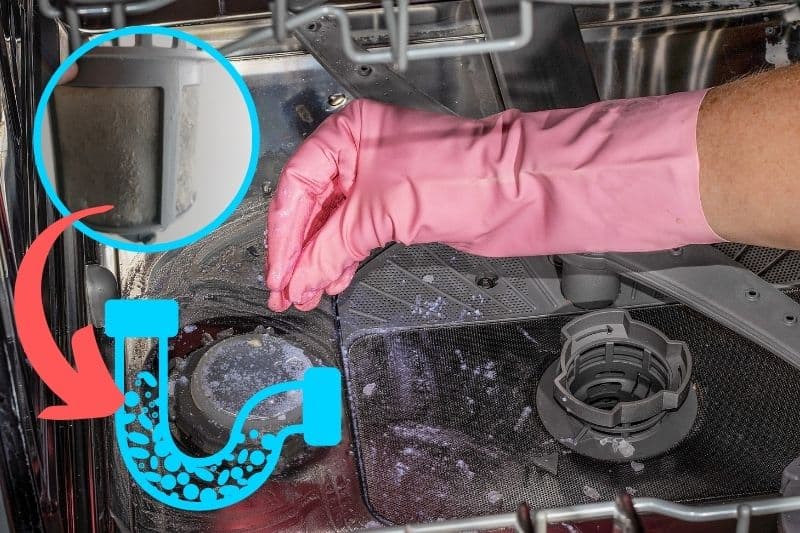
If your not sure where to look for a clog, check out these areas:
- Drain hose
- Filters
It’s important that these areas are cleaned, even if you’ve got a self-cleaning dishwasher, because clogs in these areas can build up and cause even bigger problems further down the line.
Check out our article on unblocking a dishwasher for more help.
When Should You Call for Professional Help?
The majority of the reasons I’ve listed above can generally be rectified by the dishwasher user.
For example, you can unblock a dishwasher by yourself, you can check to see how dirty your dishes are before a cycle starts, and you can make sure that you choose the correct cycles.
However, if a part needs to be repaired in your dishwasher, or you need plumbing advice, you may need to call someone in to help you out.
If you do call someone in to help you repair your dishwasher, or a plumbing-related issue, you should do your homework before they arrive, and do your research into various companies.
This way you should be able to get immediate and appropriate help, and you won’t be bothered by timewasters.

Bethan has a passion for exploring, reading, cooking and gardening! When she’s not creating culinary delights for her family, she’s concocting potions to keep her house clean!



